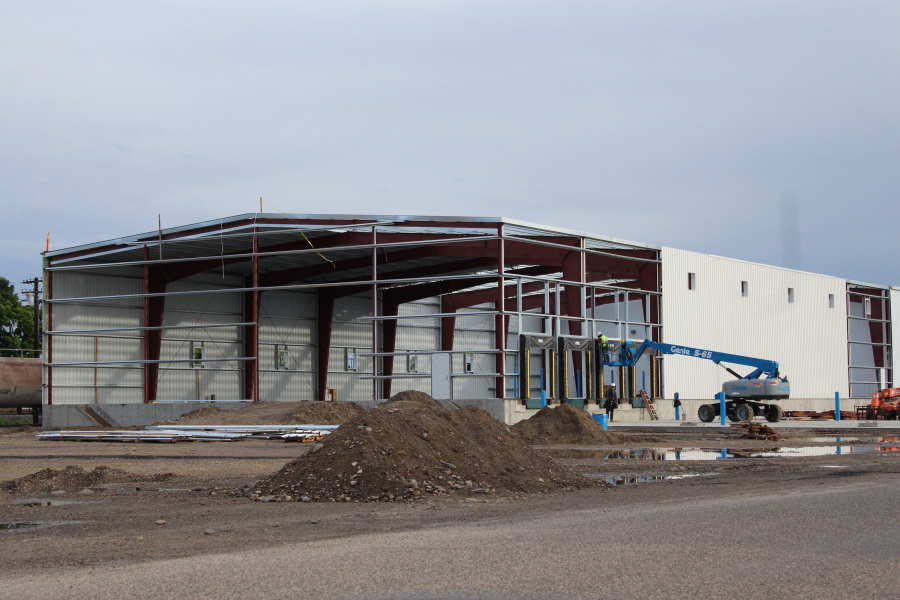ONTARIO, Ore. — As local onions packers are wrapping up sorting, packaging and shipping the 2016 crop, they are looking ahead to 2017. This year, packers will deal with a variety of challenges brought on from several sources.
One of the main sources was a winter not seen in decades. It dumped piles of snow and took down or heavily damaged a number of buildings, including a number of onions sheds both packing and storage.
“We have about a week left,” Grant Kitamura, at Murakami Produce said, noting that the 2016 crop is about out the door and has been storing well.
“I didn’t lose any onions,” he said, but, “it was an expensive winter.”
While Murakami produce did not have any buildings lost, there were building which were damaged, coupled with the cost of a lot of snow removal. All in all, however, things turned out not too bad, Kitamura said.
The main construction for Murakami Produce is a joint project under way with Baker Packing, both in Ontario, for a new “state-of-the-art” packing facility, with machinery coming in from Europe,” Kitamura said. The two firms are in the process of merging.
Payette-based Partners Produce is moving ahead with its rebuilding projects after the damaging winter.
At least 11 of its facilities collapsed or were compromised, George Rodriquez Sr., who heads the family operation, said.
“Five buildings collapsed completely,” he said.
Looking ahead toward the harvest and the start of the packing system, however, the company has arranged for the construction of new buildings and new equipment.
Presently, plans call for four storage buildings, a new fresh pack line and a new processing facility, with a tunnel freezer.
Contractors have been hired, Rodriquez said, and the buildings ordered, but it was a challenge.
“Everybody is busy,” he said
New machinery has also been ordered.
Another challenge is the cost of building materials, he said, which have gone way up.
Shay Myers, at Owyhee Produce agreed, saying that prices have gone up 20 to 25 percent since the beginning of the year.
“We’re just getting started,” Myers said, of the rebuilding process.
The company lost four buildings totally.
The rebuilding process was started early, he said, and site preparation has started for its new facilities, both packaging and storage.
“We have struggled,” he said, but three contractors were obtained.
The storage units are expected to be complete in August, but it will be early winter before the packing facility is complete, Myers said.
Both Partners Produce and Owyhee are moving their facilities over to Idaho citing financial and regulatory reasons, Myers said.
“It’s tough,” Rodriquez said about working with Oregon.
“Oregon is really tough on wages,” he said.
It is about a 50-50 split between companies staying in Oregon and Idaho, Myers said.
He would like to stay in Oregon, Myers added. However, he is at a disadvantage when competing with people right across the Snake River, he said.
Oregon lawmakers were warned recently that some of their proposed bills could make it more difficult for business along the border.
Lawmakers were told that adding more tax burden could have more businesses moving to Idaho, Jay Chamberlin, manager of the Owyhee Irrigation District, said. Chamberlin was attending a meeting for the Oregon Water Resources Congress in Salem, during which the group had a lobbying day at the Capitol.
One of the bills members were lobbying against included a bill that would create a fee for water rights, Chamberlin said, during a meeting of the Owyhee Irrigation District meeting.
“Rules and regulations are killing the little border towns” Frank Ausman, district board member said.
Another challenge is the continuing wet weather which delayed planting early and set back growth in the crops.
Ontario area farmer Bruce Corn said his crops were about three weeks behind and there is a concern about hay getting over mature before the first cutting.
Eric White, who farms in the area was hit by a recent hail storm in the Adrian area, said his red onions are coming back, while another crop’s regrowth is partial.



